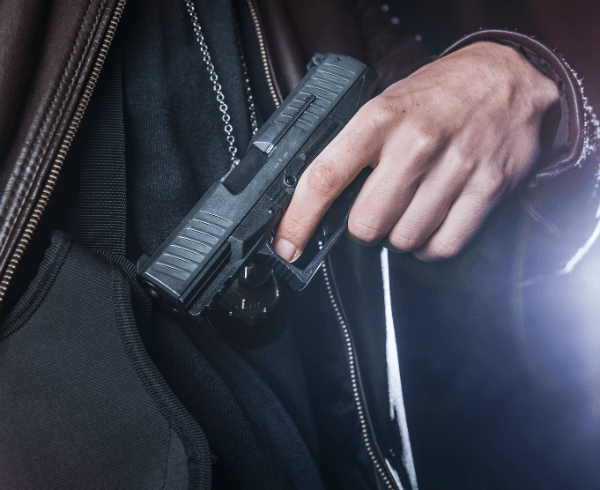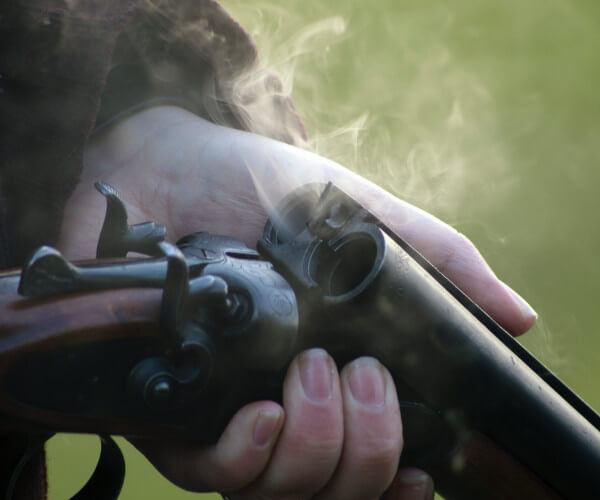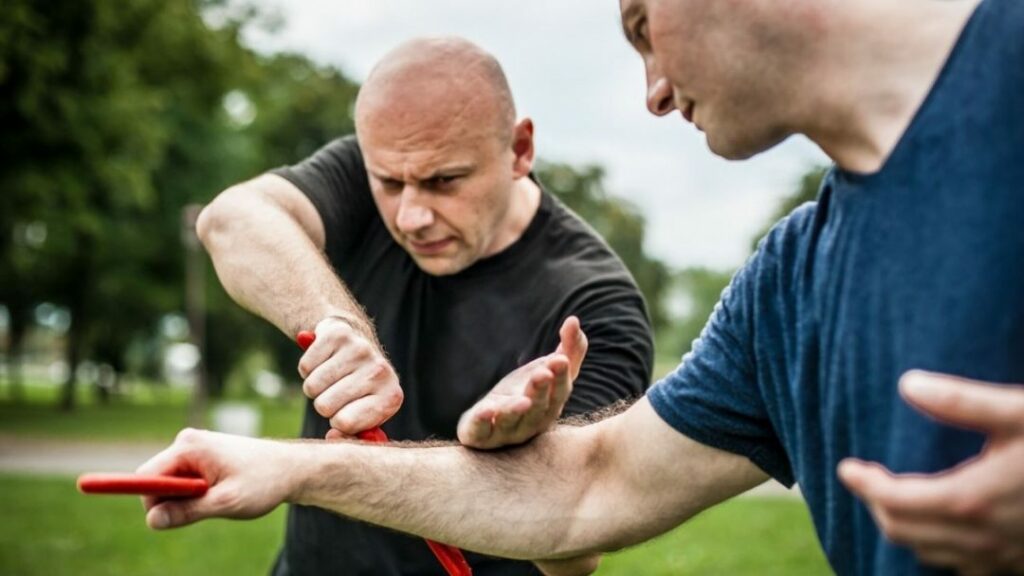Proving Self Defense In The Military
At Bilecki Law Group, We believe every service member has earned their right to an aggressive defense on their day in court. We specialize in taking the fight to the prosecution and winning cases that others said were unwinnable.
Home Court Martial Defense Violent Crimes Self Defense
Self defense and defense of another are full defenses to most assault and violent crime offenses under the UCMJ. You may believe that you have a case for self defense, but belief and proof are two different things. To prove it, you’re going to need a court martial lawyer with a with a record of doing just that. On a basic level, there are four things to look for in a self defense case.
- You perceived a true threat to your person or to other people around you.
- You were placed in fear by threats of violence against you or other people around you.
- You did not initiate the fight or provoke the opposing party.
- The force you used was proportional to the threat or force used against you.
You have a right to defend yourself from violence or the threat of violence. If you were caught up in an altercation or were party to a physical fight, you have every right to claim self defense as the cause of your actions. Claiming self defense is the easy part of course. Convincing a jury of it is another matter entirely. There are few cases we would rather try in front of a jury than those involving self defense or defense of another. When tried properly, most military juries are ready to acquit. We certainly don’t advocate for violence, but there are times when it is the just and right answer. Sometimes it’s better not to start something you can’t finish, and some people must find out the hard way.
While the concept of self defense is straightforward, its application under the UCMJ is anything but. Worse yet, there is a tremendous amount of misinformation that gets passed around by various barracks lawyers and the Lance Corporal underground. This content helps explain in detail when and how self defense and defense of another are applied in the military. As always, the easiest way to get an honest answer is to call our office and we will give you a confidential consultation and shoot you straight, every time.
Facing an Allegation?
Contact Bilecki Law Group

Timothy James Bilecki
Military law attorney
- tbilecki@bileckilawgroup.com
- Tampa, FL 33602
Homicide or Assault Involving Self Defense
Self defense is a complete defense. For self defense to exist, you must have had a reasonable apprehension that death or grievous bodily harm was about to be inflicted on yourself and you must have believed that the force you used was necessary to prevent death or grievous bodily harm.
In other words, self defense has two parts.
First, you must have had a reasonable belief that death or grievous bodily harm was about to be inflicted on yourself. The test here is whether, under the same facts and circumstances present in this case, an ordinary, prudent adult person faced with the same situation would have believed that there were grounds to fear immediate death or serious bodily harm. Because this test is objective, such matters as your intoxication or emotional instability are not relevant.
Second, you must have believed that the amount of force you used was required to protect against death or serious bodily harm. To determine your actual belief as to the amount of force, which was necessary, the jury must look at the situation through your own eyes. In addition to the circumstances known to you at the time, your age, intelligence, and emotional control are all important factors to consider in determining your actual belief about the amount of force required to protect yourself. If you believed that the amount of force you used was necessary to protect against death or grievous bodily harm, the fact that you may have used excessive force (or a different type of force than that used by the attacker) does not matter. In protecting yourself, you are not required to use the same amount or kind of force as the attacker. However, you cannot use force which is likely to produce death or grievous bodily harm.
The prosecution’s burden of proof to establish your guilt not only applies to the elements of the offense, but also to the issue of self defense. To find you guilty, the jury must be convinced beyond a reasonable doubt that you did not act in self defense.


Death or Grievous Bodily Harm Involving Self Defense.
“Grievous bodily harm” means serious bodily injury. It does not mean minor injuries such as a black eye or a bloody nose, but does mean fractured or dislocated bones, deep cuts, torn members of the body, serious damage to internal organs, or other serious bodily injuries.
If you reasonably believed that death or grievous bodily harm was about to be inflicted upon yourself, then you were permitted to use any degree of force believed necessary to protect against death or grievous bodily harm. The fact that you used excessive force or that used a different type of force than that used by the attacker does not matter.
If you reasonably believed that some harm less than death or grievous bodily harm was about to be inflicted upon you, then you were permitted to use the degree of force believed necessary to prevent that harm. However, you could not use force which was likely to produce death or grievous bodily harm. You were not required to use the same amount or kind of force as the attacker.
If you reasonably believed that death or grievous bodily harm was about to be inflicted upon you, and if you believed that the force you used was necessary to protect against death or grievous bodily harm, you must be acquitted of the offense.
If you reasonably believed that some harm less than grievous bodily harm was about to be inflicted upon you, and if you believed that the force used was necessary to prevent this harm, and such force was not likely to produce death or grievous bodily harm, you may not be convicted.
Self Defense When Death of The Victim was Unintended and Deadly Force Not Authorized
If the death of the victim occurred as an unintended result of your lawful use of force in defense of yourself then you may have a defense. In this situation, self defense is a complete defense to the unintended death of the victim if:
- First, you had a reasonable belief that bodily harm was about to be inflicted on yourself;
- Second, you believed that the force you used was necessary to protect yourself;
- Third, deadly force was not used by the you;
- Fourth, the death of victim as not intended by you; and
- Fifth, the death of the victim was not a reasonably foreseeable result of your actions.
You must have had a reasonable belief that bodily harm was about to be inflicted on yourself. The test here is whether, under the same facts and circumstances, any reasonably prudent person faced with the same situation, would have believed that there were grounds to anticipate immediate physical harm. Because this test is objective, such matters as intoxication or emotional instability are not relevant.
If the jury is convinced beyond a reasonable doubt that you either did not fear immediate bodily harm or that your fear was not a reasonable one under the circumstances, the defense of self defense does not exist.
In deciding the remaining elements of the defense of self defense, the jury must determine whether the force used by you was proper. A person who anticipates an assault may stand his or her ground and resist force with force. In protecting yourself, a person is not required to use the same type or amount of force used by the attacker. With the following principles in mind, the jury must decide whether the force used by you was legal.

Years of Experience
Court Martial Verdicts
Service Members Represented
Miles Traveled
Excessive Force to Deter in Self Defense
If there is evidence that you displayed or brandished a weapon solely to defend yourself by deterring the alleged victim rather than for the purpose of injuring the alleged victim, then you may have a defense.
A person may act in self defense to frighten or discourage an assailant or threaten more force than he or she is legally allowed to use under the circumstances.
A person who reasonably fears an immediate attack is allowed to display or threaten the use of an ordinarily dangerous weapon or an object likely to produce grievous bodily harm even though they did not have a reasonable fear of serious harm if he or she does not actually use the weapon or attempt to use it in a manner likely to produce grievous bodily harm.
Whether you were using the weapon as a deterrent or was using it in a manner likely to cause death or grievous bodily harm, is for the jury to decide. The jury’s determination rests on two factors.
First, you must have reasonably and honestly believed that the alleged victim was about to inflict some bodily harm on you. The test here is whether, under the same facts and circumstances, a reasonably prudent adult faced with the same situation, would have believed that there were grounds to anticipate immediate physical harm. Because this test is objective, such matters as intoxication or emotional instability are not relevant.
Second, you must have intended to use, and must in fact have used, the weapon or means only as a deterrent and not in a manner likely to produce death or grievous bodily harm.
If the jury is satisfied beyond a reasonable doubt that you displayed, brandished, or used the weapon in a manner likely to produce death or grievous bodily harm, rather than merely threatening its use to deter the alleged victim, the defense of self defense does not exist.
The prosecution’s burden of proof to establish your guilt applies to the issue of self defense. To find you guilty, the jury must be convinced beyond a reasonable doubt that you did not act in self defense.
Duty to Retreat in Self Defense – Stand Your Ground
If there is evidence in this case concerning your ability or lack of ability to leave or move away from your assailant, you may have a defense.
A person may stand their ground when they are at a place at which they have a right to be. Evidence tending to show that you had or did not have an opportunity to withdraw safely is a factor which should be considered along with all the other circumstances in deciding the issue of self defense. The jury is also allowed to consider any evidence as to whether you knew that other persons who might have helped you were present in the immediate area at the time of the incident.
Under the pressure of a fast-moving situation or immediate attack, you are not required to pause at your own peril to evaluate the degree of danger or the amount of force necessary to protect yourself. In deciding the issue of self defense, the jury must consider the violence and rapidity involved in the incident.

Intoxication and Self Defense
If evidence exists that indicates at the time of the offense alleged you may have been under the influence of alcohol or drugs, it will likely have no impact on your self defense claim.
On the issue of self defense alone, your voluntary intoxication should not be considered in deciding whether you were in reasonable apprehension of immediate death or grievous bodily harm or an attack upon yourself. Voluntary intoxication does not permit you to use any greater force than you would believe necessary to use when sober.
Provocation and Self Defense
If evidence exists that you may have been a person who intentionally provoked the incident or a person who voluntarily engaged in mutual fighting, you may lose the defense of self defense. A person who intentionally provoked an attack upon yourself or who voluntarily engaged in mutual fighting is not entitled to self defense unless you previously withdrew in good faith, unless it was physically impossible for you to withdraw in good faith or unless the adversary escalated the level of conflict.
A person has provoked an attack and, therefore, given up the right to self defense if he or she willingly and knowingly does some act toward the other person reasonably calculated and intended to lead to a fight or a deadly conflict. Unless such act is clearly calculated and intended by you to lead to a fight or a deadly conflict, the right to self defense is not lost.
A person may seek an interview with another in a nonviolent way for the purpose of demanding an explanation of offensive words or conduct or demanding redress of a grievance or settlement of a claim without giving up the right to self defense. One need not seek the interview in a friendly mood. The right to self defense is not lost merely because the person arms himself or herself before seeking the interview.
The burden of proof on this issue is on the prosecution. If the jury is convinced beyond a reasonable doubt that you intentionally provoked an attack upon yourself so that you could respond by injuring or killing the alleged victim, then the jury must find that you gave up the right to self defense. However, if the jury has a reasonable doubt that you intentionally provoked an attack upon yourself then the jury you must conclude that you retained the right to self defense, and, then the jury must determine if you did act in self defense.
Even if the jury finds that you intentionally provoked an attack upon yourself or engaged in mutual fighting, if you were physically unable to withdraw in good faith or if you later withdrew in good faith and indicated to you adversary a desire for peace, by words or actions or both, and if the alleged victim followed you and revived the conflict, then you were no longer voluntarily engaged in mutual fighting or provoking an attack and you were entitled to act in self defense.
If the jury has a reasonable doubt that you remained a person provoking an attack or were a voluntary mutual combatant at the time of the offense, the jury must find that you did not lose the right to act in self defense, and then, the jury must decide if you acted in self defense.
Even if the jury finds that you provoked an attack upon yourself or voluntarily engaged in mutual fighting, if the adversary escalated the level of the conflict, then you were entitled to act in self defense if you were in reasonable apprehension of immediate death or grievous bodily harm. Therefore, if you intentionally provoked an attack upon yourself by using force not likely to produce death or grievous bodily harm or voluntarily engaged in mutual fighting not involving force likely to produce death or grievous bodily harm, and the adversary escalated the level of the conflict to one involving force likely to produce death or grievous bodily harm and thereby placed you in reasonable apprehension of immediate death or grievous bodily harm, you were entitled to use the force that you actually believed was necessary to prevent death or grievous bodily harm.
Accordingly, even if the jury finds beyond a reasonable doubt that you intentionally provoked an attack upon yourself by using force not likely to produce death or grievous bodily harm or voluntarily engaged in mutual fighting not involving force likely to produce death or grievous bodily harm, but the jury has reasonable doubt that the adversary did not escalate the level of the conflict to one involving force likely to produce death or grievous bodily harm and thereby placed you in reasonable apprehension of immediate death or grievous bodily harm, you were was entitled to act in self defense.


Self Defense of Another
If the evidence has raised the issue of defense of another, you may have a complete defense.
A person may use force in defense of another only if that other person could have lawfully used such force in defense of himself or herself under the same circumstances. However, if the person you defended was also an aggressor, intentionally provoked an attack or a mutual combatant, then you could not lawfully use force on his or her behalf, regardless of your understanding of the situation.
For defense of another to exist, you must have had a reasonable belief that death or grievous bodily harm was about to be inflicted on the person defended, and, you must have believed that the force you used was necessary to protect that person.
In other words, defense of another has two parts.
First, you must have had a reasonable belief that death or grievous bodily harm was about to be inflicted on the person you defended. The test here is whether, under the same facts and circumstances, a reasonably prudent person, faced with the same situation, would have believed that death or grievous bodily harm was about to be inflicted.
Second, you must have believed that the amount of force you used was necessary to protect against death or grievous bodily harm. To determine your actual belief as to the amount of force necessary, the jury must view the situation through your eyes. In addition to what was known at the time, your age, intelligence, and emotional control are all important factors to consider in determining your actual belief as to the amount of force necessary to protect the person you defended. If you believed that the amount of force you used was necessary to protect against death or grievous bodily harm, the fact that you may have used such force or a different type of force than that used by the attacker does not matter.
The burden is on the prosecution to establish your guilt. Unless the jury is satisfied beyond a reasonable doubt that you did not act in defense of another, the jury must acquit.
Complex Issues Call For Experienced Defense Attorneys
As you can see, while the concept of self defense and defense of others is simple, the military law on the issue certainly is not. If you were in a situation in which you had to use self defense to protect yourself or someone else and now you are being charged at a court martial, give us a call. We have been there before, many times, and will shoot you straight, make sure all your questions get answered and ensure that you are well represented.
Violent Crime Service Areas
your path to legal defense
Get in Touch
- tbilecki@bileckilawgroup.com
- 813-669-3500
- Bilecki Law Group, PLLC, 601 S. Harbour Island BLVD, Suite 109 Tampa, FL 33602
